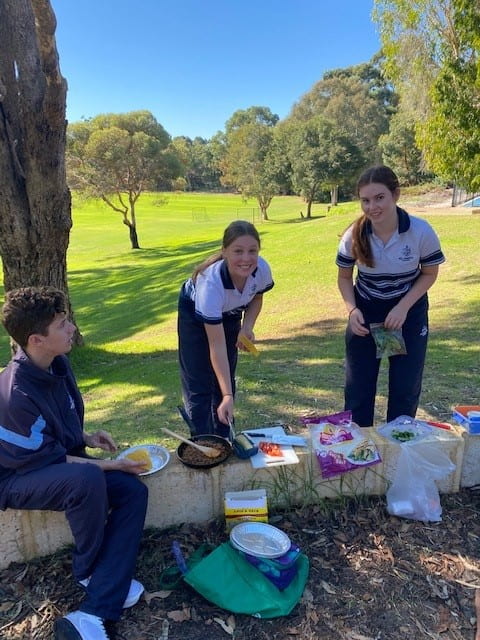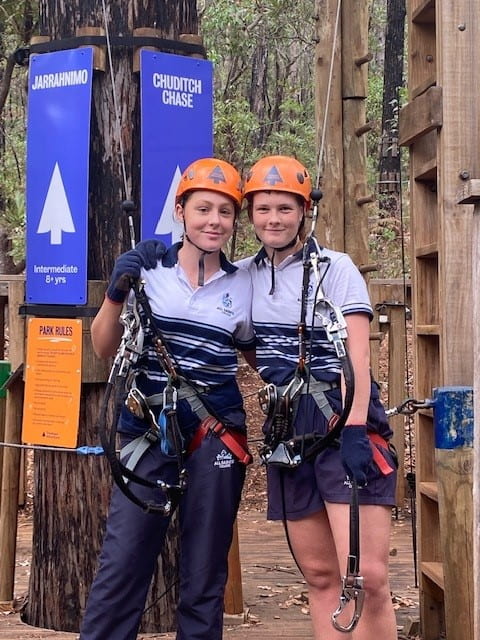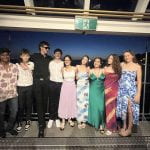In lock 2022, I have learned many things that I hope will help me in the future. During the course, we focused on three main areas kayaking, roping climbing, and bush cooking. Along with learning some life skills, I was able to grow my capabilities, by being physically and mentally challenged.
GOALS
When I first started doing lock, I had very specific goals in mind. One of my objectives was to make the most of my time and enjoy every opportunity that came my way. I utilised my love for the outdoors and design thinking skills to my advantage.
KAYAKING
Kayaking was one of the activities we learned in Lock for 2022; every week during our double period, we went to Shelley foreshore, joined by paddle Australia to learn and improve our kayaking skills. During the kayaking course, my lock class learned how to use a skirt while kayaking, different strokes, and how to capsize properly. I preferred this part of the course because, despite the fact that it was always cold in the water, I was able to get outside and away from my studies.
ROPING AND CLIMBING
I enjoyed the roping and climbing unit. To begin, I had to learn a variety of knots that will not only help me rock climb, but will also be beneficial in future adventures and in an emergency. We then learned how to belay a person climbing after learning these knots, which involves either someone else putting their life in your hands or you putting your life in the hands of someone else. We started climbing on the wall after learning how to belay; although it was difficult and I did not reach the top, I learned to trust others more.
BUSH COOKING
I’ve always enjoy being outside and camping, so I believe bush cooking would be a fantastic course for me to take. During bush cooking, I learned how to build an efficient fire outside with sticks as fuel and ways for getting enough oxygen into the fire. I learned how to cook properly over an open fire after I could build a good fire and burn it down to hot coals. From there, I spent the rest of the semester participating in a Masterchef challenge with another classmate, making a different type of cuisine each week.

DWELLINGUP DAY CAMP
In Lock, there is usually a week-long camp, but due to covid-19, ours got cancelled and we could only have a day camp down in Dwellingup. Despite the fact that we did not get to go camping, we still had a good time as we were spending time outdoors.
We did bush cooking, a high-ropes course, and kayaking at our Dwellingup day camp. When we arrived at Nanga Mill, our base camp, we had to cook a meal based on which rotation we were on; mine was the first, so my cooking group and I created pancakes with Nutella, Milo and Oreos. We didn’t have a pan, so we had to cook on a very unclean hot plate, which got really hot but surprisingly cooked the pancakes to perfection. The pancakes were excellent because we filled them with Nutella or once put Oreos in the batter. We also roasted some marshmallows over the fire since it still had a flame and was hot. Even though it was very unhealthy, the meal was very filling and kept us going for the remainder of the day.
The leave no trace emu bob was the second step of bush cookery. We need to leave no trace because we want to preserve the land we utilise for future generations of visitors. It’s also crucial to protect native animals, which we all appreciate. I set a goal for myself during this activity to pick up as much trash as I could carry. By staying in a small area, I was able to accomplish this rapidly. I discovered that the more trash I picked up, the more I was able to view. I found many small bits of plastic and foil left by previous campers at the end of the emu bob. Because the one-day camp took place right after Easter, the floor was littered with Easter egg wrappers. This meant that we needed to take more care and look carefully because the rubbish was very small.

We went to Treetop Adventures, which is a series of high ropes courses, after cooking over the fire and completing the emu bob. This was something I had done in the year eight camp, but it was nice to return with more experience and take on the more difficult courses. This was a lot of fun and definitely the highlight of my day in Dwellingup because you could tackle the course entirely on your own and had your buddies around to help you if you got trapped or terrified.
Kayaking was the day’s final activity, even though my group didn’t have much time in the water because we had to drive to a location approximately twenty minutes away, and there were roadworks along the way. To get in we had to drop in off of a staircase into the water. This was my first time rolling down a staircase so it was a little scary, but fun at the same time. I reasoned that if I didn’t fall in, I’d be able to avoid becoming extremely cold and wet. Surprisingly I didn’t when I went down the staircase but I did this by taking it slowly and leaning forwards while sinking in with my paddle balanced on the ground, which I was very happy about. Even though we barely had time to get in the water, and explore for a while, I still had a very good time.
Overall, I had a great time on this day, and even though there were a lot of challenges to overcome, the end product was fantastic, and it taught me that even if something isn’t right or there, you can still have a good day.
LEAVE NO TRACE
When going camping or just travelling around the world, knowing how to leave no trace is essential. Leave no trace contains seven key concepts that aim to preserve the area you’re in as good as it was when you arrived, if not better. These are the guiding principles:
- Plan Ahead and Prepare
- Travel and Camp on Durable Surfaces
- Dispose of Waste Properly
- Leave what you Find
- Minimize Campfire Impacts
- Respect Wildlife
- Be Respectful of Others
We accomplished many of these procedures during the camp; for example, when we built our fire, we had to burn it down to nothing in the end and make sure it was out so it wouldn’t spread to the rest of the community. We also showed respect for wildlife and others by not being too loud and not chasing, feeding, or following any of them. W completed an emu bob towards the end of cooking, which is when the entire group lines up tightly and moves forwards looking for any trash. This is an effective approach for collecting trash because it is difficult to miss any and a large area can be covered rapidly. We also had to arrange our meals and what we’d need for the day, as well as dispose of any trash we found or created.
CAPABILITIES
This elective required us to use the ASC fundamental skills to challenge our thoughts and explore new avenues of thought. We have to be well-organized, collaborative, innovative, curious, and communicative. These considerations aided in enjoying the course while helping us push our boundaries in order to learn new skills.
Taking part in the 2022 Lock – Outdoor Ed Course was an excellent opportunity to build on my capabilities. Different sections of the course challenge me with new thinking and allowed me to grow specific capabilities.

Teamwork
During the emu bob, we utilized the capability of teamwork as we were able to search a larger area for trash by creating a continuous line rather than working individually. This not only cut down on the time it took to scan the entire area, but also ensured that we grabbed all of the trash we could see.
Resilience
I learned resilience as a result of taking part in the kayaking section of lock. I had to be calm and fix the problem by getting out of the kayak or dragging myself back out of the water every time I capsized. I did this a lot of times when learning and sometimes it was very annoying and difficult if I was tired, but once I got back into the kayak I would have fun.
Effective Communication
During the course, effective communication was essential otherwise it wouldn’t have run as smoothly as it did. During the rock climbing section we had to work as a team and communicate clearly with each other, otherwise, as the belayer, I could have easily dropped the climber. To figure this out, my partner and I had to go about what was going on and do things like advising the climber to slow down if we were getting overwhelmed when belaying.
Organization
The organization was key during my time in the lock. You needed to know where you were going and what you had to bring, otherwise, you were not prepared and you could let your group down or just make it difficult for yourself. Bush cooking was part of the course where the organization was especially needed since you were working in groups. You needed to remember to bring everything and have stuff prepared before the lesson so cooking ran smoothly.
Overall, my Lock elective has been an incredible learning experience. I’ve had a lot of fun learning bush culinary skills and have been able to take my kayaking skills much further than I ever imagined. This elective comes highly recommended by me to anyone who is eager to take on a challenge and step outside of their comfort zone.

